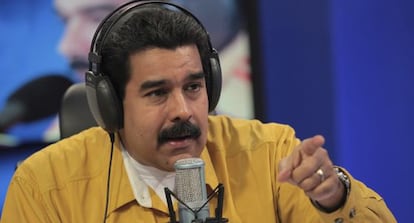Government division delays economic reforms in Venezuela
Cuban consultant who worked with Che Guevara is brought in to streamline bureaucracy

All of Venezuela was holding its breath last Tuesday. It was the day when President Nicolás Maduro was due to release details about what he terms “el sacudón” (the shakeup), a restructuring plan to streamline government and address the economic crisis that is gripping the country.
The matter was apparently so urgent that the president rescheduled his weekly program, En contacto con Maduro (In touch with Maduro), before traveling to Brazil that night to take part in the summit of BRICS nations.
Yet the television program began three hours behind schedule. And when it did, Hugo Chávez’s successor let his audience down by postponing his important announcements until August 15. Instead, Maduro treated everyone to a special feature about the first anniversary of his marriage to “First Combatant” Cilia Flores, including a video of the happy couple that he ordered the station to air.
What had happened?
The country urgently needs economic decisions to be made. Shortage of essential consumer products has become chronic, and inflation is nearing annual 80 percent. The price of a barrel of oil, Venezuela’s main source of income, has been falling for five straight weeks.
Yet consensus regarding the measures to be taken is becoming increasingly hard to reach. The government is divided between a sector that is willing to be pragmatic and do what it takes to save the Bolivarian revolution, and another sector that feels that these adjustment measures would betray the ideals of the revolution, even if they served to hold on to power.
The strongest figure in the government’s economic department is Rafael Ramírez, energy minister and president of the state oil company, Pdvsa. Ramírez favors a deal with the business sector, and Venezuela’s international creditors see him as their favorite public official, the one who is most likely to defend their interests. However, the measures encouraged by Ramírez —including raising local gas prices and unifying exchange rates—remain nothing more than a plan.
Cuba is very keen to ensure that Venezuela remains financially viable as a country
The “sacudón” that was supposed to be announced on Tuesday is the result of consulting work by Orlando Borrego, a 78-year-old Cuban civil servant who was a personal assistant to Ernesto “Che” Guevara during his guerrilla warfare and at the industry ministry during the first years of the Cuban revolution. Borrego and a team of top Venezuelan officials led by Planning Minister Ricardo Menéndez have been inspecting the state structure to eliminate redundancies and cut through all the red tape.
But Borrego’s presence is more political than technical. The Castro regime has few successful ventures to export in terms of economic management. But a historical member of the Cuban Revolution does have sufficient authority to force a consensus among warring factions that have been growing further apart ever since the death of Hugo Chávez in March 2013.
Beyond the dogmatism, Cuba is very keen to ensure that Venezuela remains financially viable as a country, since it has been Cuba’s generous provider of oil and currency for the last 15 years. And the government is aware that this will require taking several spoonfuls of pragmatic medicine.
It could all come to a head at the Third United Socialist Party of Venezuela (PSUV) Congress, scheduled for July 26-28. This is when the government alliance will attempt to take the reins of the party and eliminate all dissidence with regard to the change of tack that will likely be applied by the post-Chávez regime.
Tu suscripción se está usando en otro dispositivo
¿Quieres añadir otro usuario a tu suscripción?
Si continúas leyendo en este dispositivo, no se podrá leer en el otro.
FlechaTu suscripción se está usando en otro dispositivo y solo puedes acceder a EL PAÍS desde un dispositivo a la vez.
Si quieres compartir tu cuenta, cambia tu suscripción a la modalidad Premium, así podrás añadir otro usuario. Cada uno accederá con su propia cuenta de email, lo que os permitirá personalizar vuestra experiencia en EL PAÍS.
En el caso de no saber quién está usando tu cuenta, te recomendamos cambiar tu contraseña aquí.
Si decides continuar compartiendo tu cuenta, este mensaje se mostrará en tu dispositivo y en el de la otra persona que está usando tu cuenta de forma indefinida, afectando a tu experiencia de lectura. Puedes consultar aquí los términos y condiciones de la suscripción digital.








































